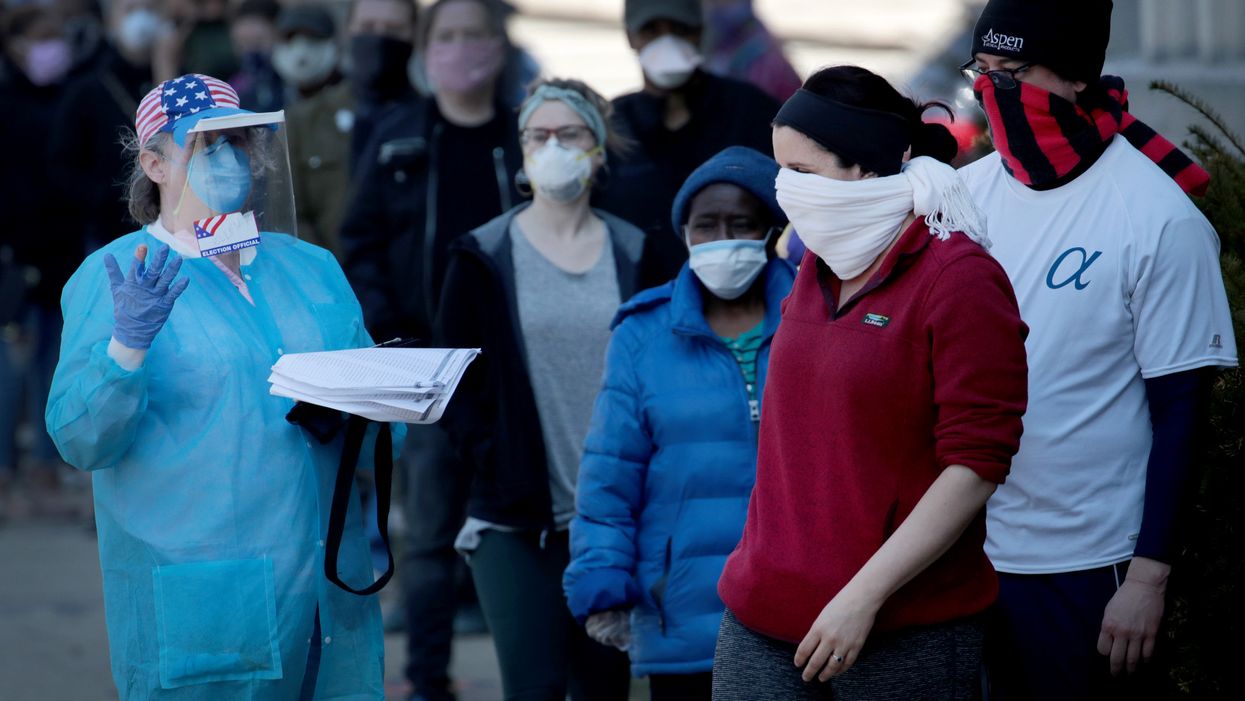Within just a few days, Wisconsin has become the center of the coronavirus-election debate universe with a blur of back and forth by state officials and the courts.
The governor said Monday afternoon that in-person primary voting was off. Hours later, the state Supreme Court said it was on, and in fact polls opened Tuesday morning.
Last Thursday a federal judge said that, with or without polling stations to visit, voters could complete absentee ballots and they'd be counted so long as they arrived at election offices by April 13. Late Monday, the U.S. Supreme Court said, no, absentee ballots would be valid only if postmarked by primary day.
For those who care about good governance and fair democratic play — but who may have gotten lost — here are answers to some questions you may have:
Where does a governor or another official get the authority to delay an election?
A dozen states have some provision that allows for delays in elections during emergencies, according to the National Conference of State Legislatures: Idaho, Florida, Kentucky, Hawaii, Louisiana, Maryland, New York, Oregon, South Carolina, South Dakota, Utah and Virginia.
The exact mechanisms vary widely, however. Several states give the governor the authority, but in Utah, for example, the local officials can set a new election if there is a pending disaster.
And, notably, Wisconsin is not on the list, so Democratic Gov. Tony Evers was never on rock solid legal ground.
How many votes won't get counted because of the U.S. Supreme Court's ruling?
We're not sure, but there is a way to estimate. The 5-4 decision means only absentee ballots postmarked (or hand delivered) by Tuesday will get counted, and they have to arrive within six days.
By the time the polls opened, 1,282,762 applications had been received, according to the Wisconsin Election Commission. Counting on a week for the requested absentee ballot to arrive, that means only requests fulfilled by March 31 would get to voters in time for them to be returned by the deadline.
That number, the election board said, is 942,350. That suggests as many as 340,412 absentee votes will not get counted — or 26 percent of the ballots sent out. To be sure, some of those people are heading out in person. And, by assuming a faster turnaround time of just three days, then maybe as few as 3 percent of the absentee votes (43,285) won't get counted.
Wasn't the governor in favor of having the election as scheduled before he was against it?
Sort of. Last Wednesday, Evers was making arrangements for the National Guard to replace poll workers who had canceled because of health concerns. "If I could have changed the election on my own, I would have but I can't without violating the law," he said then.
Three days later, after the GOP-controlled Legislature rejected his request to pass legislation delaying the election, Evers declared he was suspending in-person voting.
"The bottom line is that I have an obligation to keep people safe, and that's why I signed this executive order," he said.
Later Monday, when the governor's decree was struck down 4-2 by the state Supreme Court, Evers said: "In this time of historic crisis, it is a shame that two branches of government in this state chose to pass the buck instead of taking responsibility for the health and safety of the people we were elected to serve."
What power does the Wisconsin governor have in an emergency?
State law gives a variety of powers for the governor when he declares an emergency, which Evers did. They range from the mundane, such as waiving fees for permits, to the more substantive, such as suspending any administrative rule. The state's high court held that, if the Legislature wanted to extend these powers to include altering laws such as the one setting election dates, it could have done so — but it didn't.
Did any justice say the governor has such authority?
Yes. Justice Ann Walsh Bradley cited a part of the law delineating emergency powers that says the governor may "issue such orders as he or she deems necessary for the security of persons and property." Bradley argued that the "security of persons" includes not putting them in position to get sick from voting, and she was joined in dissent by Justice Rebecca Frank Dallet.
Why didn't the health department stop the vote?
Very interesting question! That's what happened in Ohio last month. After GOP Gov. Mike DeWine was told he couldn't unilaterally stop in-person voting, he got the director of the state Health Department to declare a public health emergency and stopped the polls from opening just hours ahead of time.
In the Wisconsin high court dissent, Bradley noted how state law allows the health department "to forbid public gatherings" to control outbreaks and also "may authorize and implement all emergency measures necessary to control communicable diseases." The court majority dismissed this reasoning, noting that "none of these arguments were cited or raised by the governor."
Is all this hassle over a presidential primary Joe Biden seems sure to win?
No. It's true the polls show Biden getting a strong majority of the 77 delegates in a state Sen. Bernie Sanders won four years ago. The race on the ballot that's got both parties so riled up is for a seat on the state Supreme Court, with incumbent conservative Justice Daniel Kelly hoping to fend off a more progressive candidate, Jill Karofsky. (Kelly recused himself from the case decided Monday.)
In addition, hundreds of officially nonpartisan local races are on the ballot, and those mayor's offices and county executive jobs become vacant April 20 if no one gets elected before then.




















